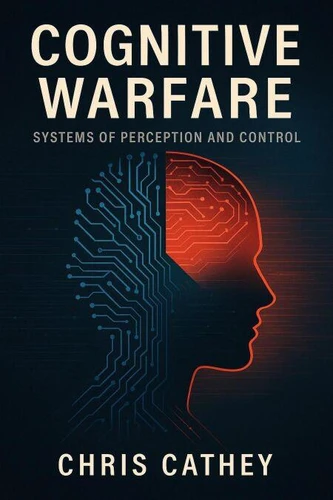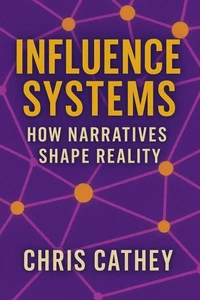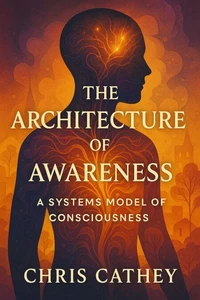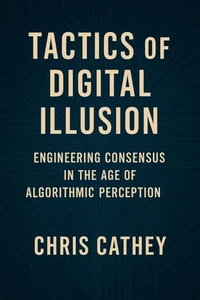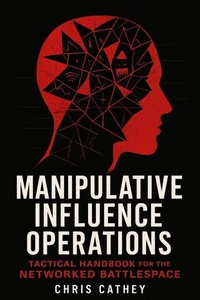Nouveauté
Cognitive Warfare: Systems of Perception and Control
Par :Formats :
Disponible dans votre compte client Decitre ou Furet du Nord dès validation de votre commande. Le format ePub est :
- Compatible avec une lecture sur My Vivlio (smartphone, tablette, ordinateur)
- Compatible avec une lecture sur liseuses Vivlio
- Pour les liseuses autres que Vivlio, vous devez utiliser le logiciel Adobe Digital Edition. Non compatible avec la lecture sur les liseuses Kindle, Remarkable et Sony
 , qui est-ce ?
, qui est-ce ?Notre partenaire de plateforme de lecture numérique où vous retrouverez l'ensemble de vos ebooks gratuitement
Pour en savoir plus sur nos ebooks, consultez notre aide en ligne ici
- FormatePub
- ISBN8232616854
- EAN9798232616854
- Date de parution15/11/2025
- Protection num.pas de protection
- Infos supplémentairesepub
- ÉditeurHamza elmir
Résumé
Cognitive Warfare: Systems of Perception and Control reveals how modern conflict has shifted into the realm of human thought, attention, and perception. This book exposes the systems, tools, and strategies used to shape belief, influence behavior, and control narratives in an era defined by information saturation. Grounded in cognitive science, systems theory, cybernetics, intelligence methodology, and emerging technologies, this manual provides a comprehensive framework for understanding how perception is engineered in the digital age.
It examines how actors collect data, design influence campaigns, exploit psychological vulnerabilities, and compete for dominance inside the human mind. Drawing from contemporary research and operational models, the book shows how cognition has become a contested battlespace and why mastering its dynamics is essential for both national security and individual sovereignty. Inside, you will learn:. How cognition became a domain of conflict and why narrative control shapes modern power.
The mechanisms of perception, attention, memory, bias, and behavioral contagion. Ethical, legal, and governance challenges created by cognitive influence strategies. Models of cognitive advantage used by military and intelligence organizations. The architecture of information flow, sensing systems, data pipelines, and analytic cycles. Methods for measuring influence effects, attribution, and confidence scoring.
Target mapping and persona engineering techniques used to shape specific populations. The role of micro targeting, memetic dynamics, synthetic media, and algorithmic amplification. How AI, predictive modeling, and narrative generation transform cognitive operations. Strategic and tactical planning frameworks for designing cognitive campaignsThis book is written for strategists, security professionals, analysts, researchers, and anyone seeking to understand the forces competing for influence in the cognitive domain.
It examines how actors collect data, design influence campaigns, exploit psychological vulnerabilities, and compete for dominance inside the human mind. Drawing from contemporary research and operational models, the book shows how cognition has become a contested battlespace and why mastering its dynamics is essential for both national security and individual sovereignty. Inside, you will learn:. How cognition became a domain of conflict and why narrative control shapes modern power.
The mechanisms of perception, attention, memory, bias, and behavioral contagion. Ethical, legal, and governance challenges created by cognitive influence strategies. Models of cognitive advantage used by military and intelligence organizations. The architecture of information flow, sensing systems, data pipelines, and analytic cycles. Methods for measuring influence effects, attribution, and confidence scoring.
Target mapping and persona engineering techniques used to shape specific populations. The role of micro targeting, memetic dynamics, synthetic media, and algorithmic amplification. How AI, predictive modeling, and narrative generation transform cognitive operations. Strategic and tactical planning frameworks for designing cognitive campaignsThis book is written for strategists, security professionals, analysts, researchers, and anyone seeking to understand the forces competing for influence in the cognitive domain.
Cognitive Warfare: Systems of Perception and Control reveals how modern conflict has shifted into the realm of human thought, attention, and perception. This book exposes the systems, tools, and strategies used to shape belief, influence behavior, and control narratives in an era defined by information saturation. Grounded in cognitive science, systems theory, cybernetics, intelligence methodology, and emerging technologies, this manual provides a comprehensive framework for understanding how perception is engineered in the digital age.
It examines how actors collect data, design influence campaigns, exploit psychological vulnerabilities, and compete for dominance inside the human mind. Drawing from contemporary research and operational models, the book shows how cognition has become a contested battlespace and why mastering its dynamics is essential for both national security and individual sovereignty. Inside, you will learn:. How cognition became a domain of conflict and why narrative control shapes modern power.
The mechanisms of perception, attention, memory, bias, and behavioral contagion. Ethical, legal, and governance challenges created by cognitive influence strategies. Models of cognitive advantage used by military and intelligence organizations. The architecture of information flow, sensing systems, data pipelines, and analytic cycles. Methods for measuring influence effects, attribution, and confidence scoring.
Target mapping and persona engineering techniques used to shape specific populations. The role of micro targeting, memetic dynamics, synthetic media, and algorithmic amplification. How AI, predictive modeling, and narrative generation transform cognitive operations. Strategic and tactical planning frameworks for designing cognitive campaignsThis book is written for strategists, security professionals, analysts, researchers, and anyone seeking to understand the forces competing for influence in the cognitive domain.
It examines how actors collect data, design influence campaigns, exploit psychological vulnerabilities, and compete for dominance inside the human mind. Drawing from contemporary research and operational models, the book shows how cognition has become a contested battlespace and why mastering its dynamics is essential for both national security and individual sovereignty. Inside, you will learn:. How cognition became a domain of conflict and why narrative control shapes modern power.
The mechanisms of perception, attention, memory, bias, and behavioral contagion. Ethical, legal, and governance challenges created by cognitive influence strategies. Models of cognitive advantage used by military and intelligence organizations. The architecture of information flow, sensing systems, data pipelines, and analytic cycles. Methods for measuring influence effects, attribution, and confidence scoring.
Target mapping and persona engineering techniques used to shape specific populations. The role of micro targeting, memetic dynamics, synthetic media, and algorithmic amplification. How AI, predictive modeling, and narrative generation transform cognitive operations. Strategic and tactical planning frameworks for designing cognitive campaignsThis book is written for strategists, security professionals, analysts, researchers, and anyone seeking to understand the forces competing for influence in the cognitive domain.

